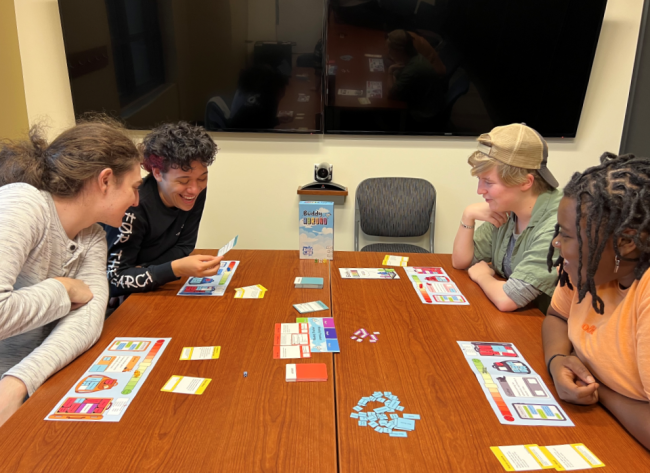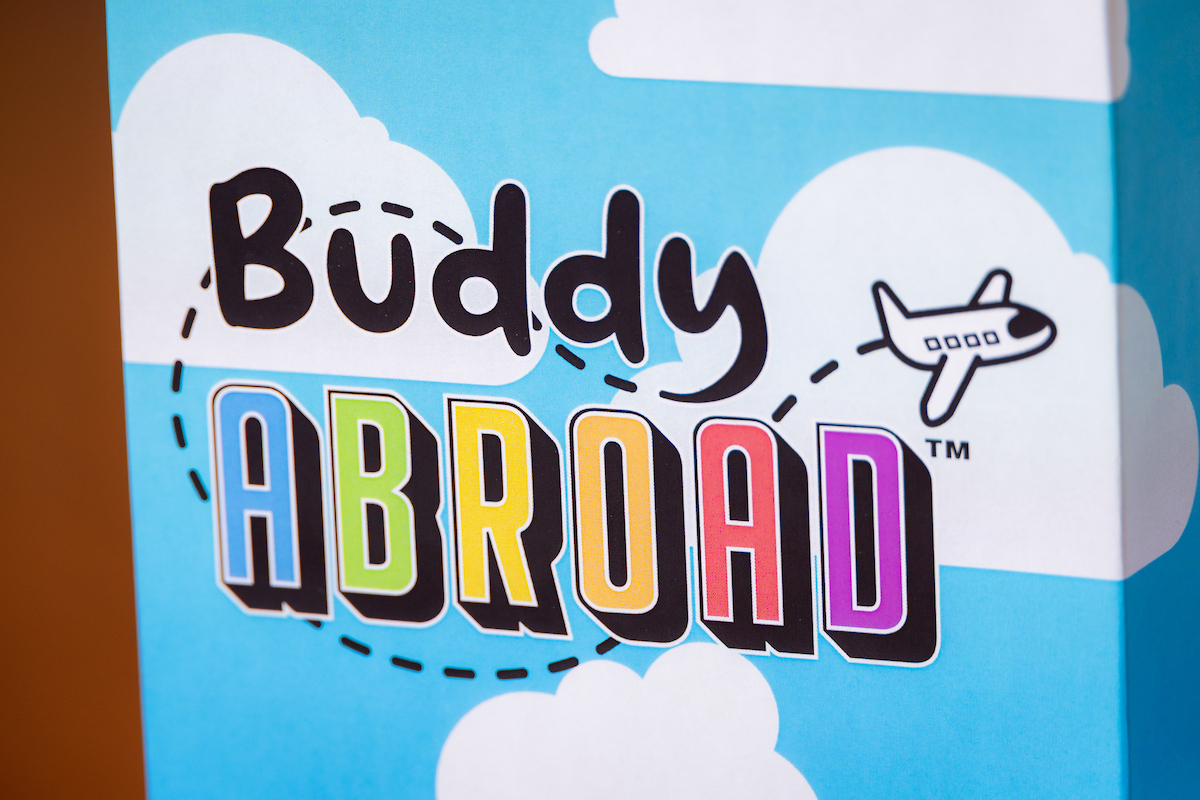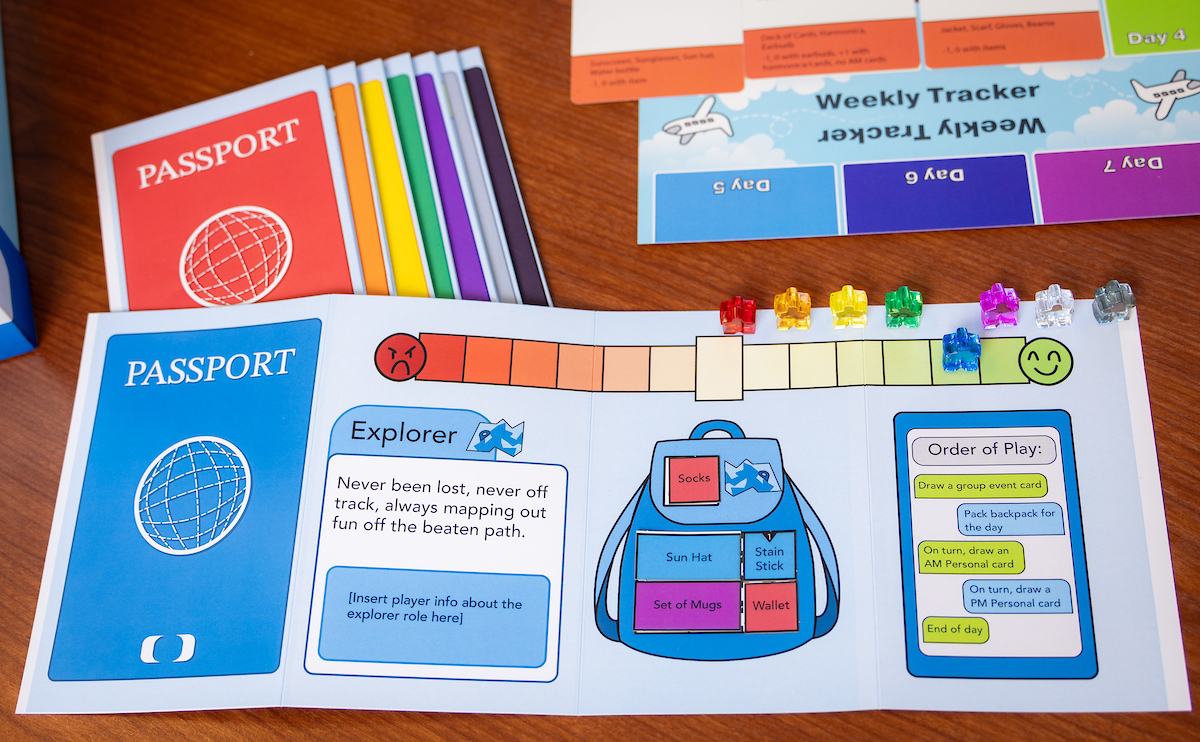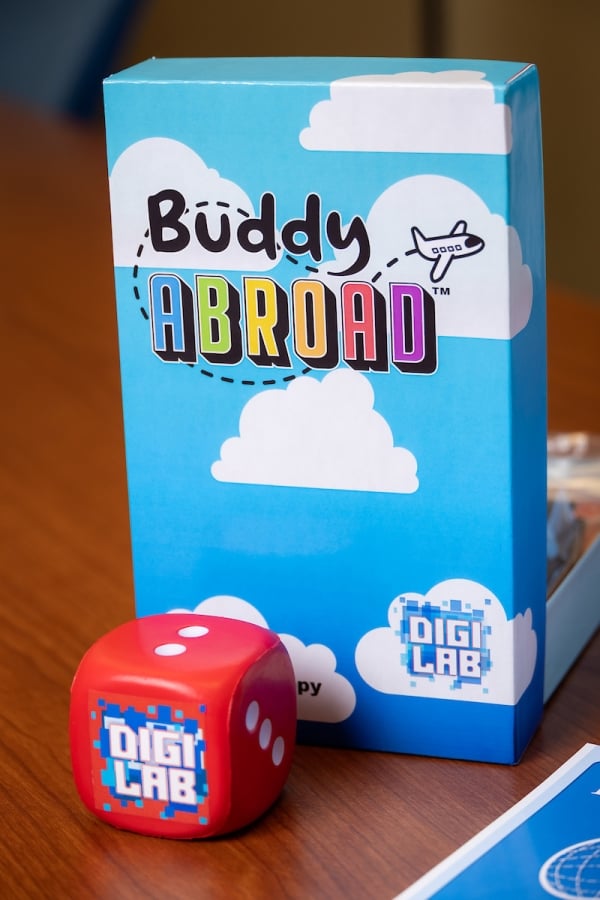You have /5 articles left.
Sign up for a free account or log in.

DePaul University students Crane Benson, Silver MacAuley, Jules Mortensen and Ope Animashaun helped develop Buddy Abroad, a new board game from the DePaul Instructional Game and Innovation Lab.
Jes Klass/DePaul University
Eight students are traveling together on a weeklong trip, hoping for the adventure of a lifetime. Each day, they face new and challenging events, testing their relationships and personal wellness. Making it to the end on a positive note is their goal. Or, at least, that’s how one is supposed to play Buddy Abroad.
Buddy Abroad is a new board game designed by DePaul University’s Instructional Game and Innovation Lab (DIGI), one of 25 projects the lab has created since launching.
The board game is designed to give students insight into how study abroad might push them out of their comfort zones and teach them ways to address issues that come up.

Students at DePaul University preparing to go abroad will play a board game, Buddy Abroad, encouraging teamwork, collaboration, communication and packing preparation.
Jeff Carrion/DePaul University
The inspiration: DePaul offers a variety of study abroad opportunities, including term-length, short-term and first-year abroad programs. The university anticipates around 1,000 students studying abroad this academic year.
Jes Klass, senior instructional designer at DePaul’s Center for Teaching and Learning and a professor of computing and digital media, participated in a FY@broad program to London and Wales this past year. Prior to departure, Klass and her students completed training with the study abroad office and “during the training I was like, ‘This could totally be a game,’” Klass says.
Klass has an M.F.A. in game design and heads up DIGI, located in the CTL. “Every time I’m presented with a problem, I’m like, ‘Cool, let’s make a game about it,’” Klass says.

DIGI employs four student workers, who all worked on Buddy Abroad, Jules Mortensen, Silver MacAuley, Ope Animashaun and Crane Benson.
Jes Klass/DePaul University
Not everything makes a good game, but DePaul’s study abroad training highlights social connection, wellness and being prepared for the unexpected, which Klass found had easy parallels with game play.
Putting it together: DIGI has four student employees who contributed to the creation and design of Buddy Abroad, and staff and faculty from across the university provided ideas and insights.
Throughout the game, players will encounter real-life scenarios shared by the study abroad office or game testers, Klass says.
The project took about seven months to develop, not including testing by players and receiving additional feedback from students, faculty and staff. Four groups of community members played the game to test it, and three completed formal questionnaires.
DIGI also created an expansion pack with more serious issues for older players, which requires students to address discrimination, loss, conflict or intoxication, among other topics. To get around a serious scenario, students must discuss the problem and establish the overall hit to the group’s wellness, requiring direct communication and conflict-resolution skills.

Jeff Carrion/DePaul University
How it works: Three to eight players can play Buddy Abroad together.
The game centers around student wellness during a seven-day trip—to win, all players must have a wellness score of at least one by the end of their travel.
Each player is assigned an archetype and selects a variety of items to pack in their suitcase before starting the game. Students must pack seven essential items (i.e., passport, wallet) and can choose additional they want (stuffed animal, camera, laundry stain stick), but different items will come in handy throughout the game.
During game play, students pull a group card each round that affects general dynamics and setting, then must roll the die to see how great the impact is. A group card may tell players that they’re encountering interpersonal conflict, detracting from their wellness score.
Players then select items from their suitcases to place in their backpacks for their day excursions.
Then, each player pulls a personal card that shares an experience their character is dealing with that day, which impacts their wellness score. A personal card may say students had a fun day sightseeing or stained their clothing. Depending on the items packed in their bags, students can increase wellness points, or they can ask other players for help.
After seven days, students evaluate their final wellness score—ideally, all players make it out happy and healthy. “Everyone had to have had a pretty good time,” Klass says. “That really incentivizes them to be looking out for one another and to make sure that if anyone’s having a bad time, they really start to take action to help that person.”

Jeff Carrion/DePaul University
Learning outcomes: The game-based learning model was effective in teaching students how to manage problems. Klass tested the game on some of her FY@broad students, who would compare their lived experiences in London and Wales to Buddy Abroad. “They’d be like, ‘This happened in the game!’ Or, like, ‘I have a water bottle, because it was emphasized to me that this was important to have a water bottle in these moments,’” Klass says.
Buddy Abroad also creates relationships between players and allows them to get to know peers before their trips.
The study abroad office at DePaul will use Buddy Abroad to prep students going abroad in the future, and other classes around the institution also are using Buddy Abroad.
Buddy Abroad is available for purchase, as well, for higher education practitioners looking to engage students in an inviting and fun manner.
“It introduces serious concepts and serious things that they need to learn in a way that has some silliness, too,” Klass says. “It is more palatable than just me standing there and being like, ‘If you step in a puddle and you don’t have an extra pair of socks, you’re going to hate your life all day,’ or things like that.”
While Buddy Abroad was designed for study abroad participants, it has useful advice for all student travelers and could even be enjoyed by a board game hobbyist, Klass says.
If your student success program has a unique feature or twist, we’d like to know about it. Click here to submit.




